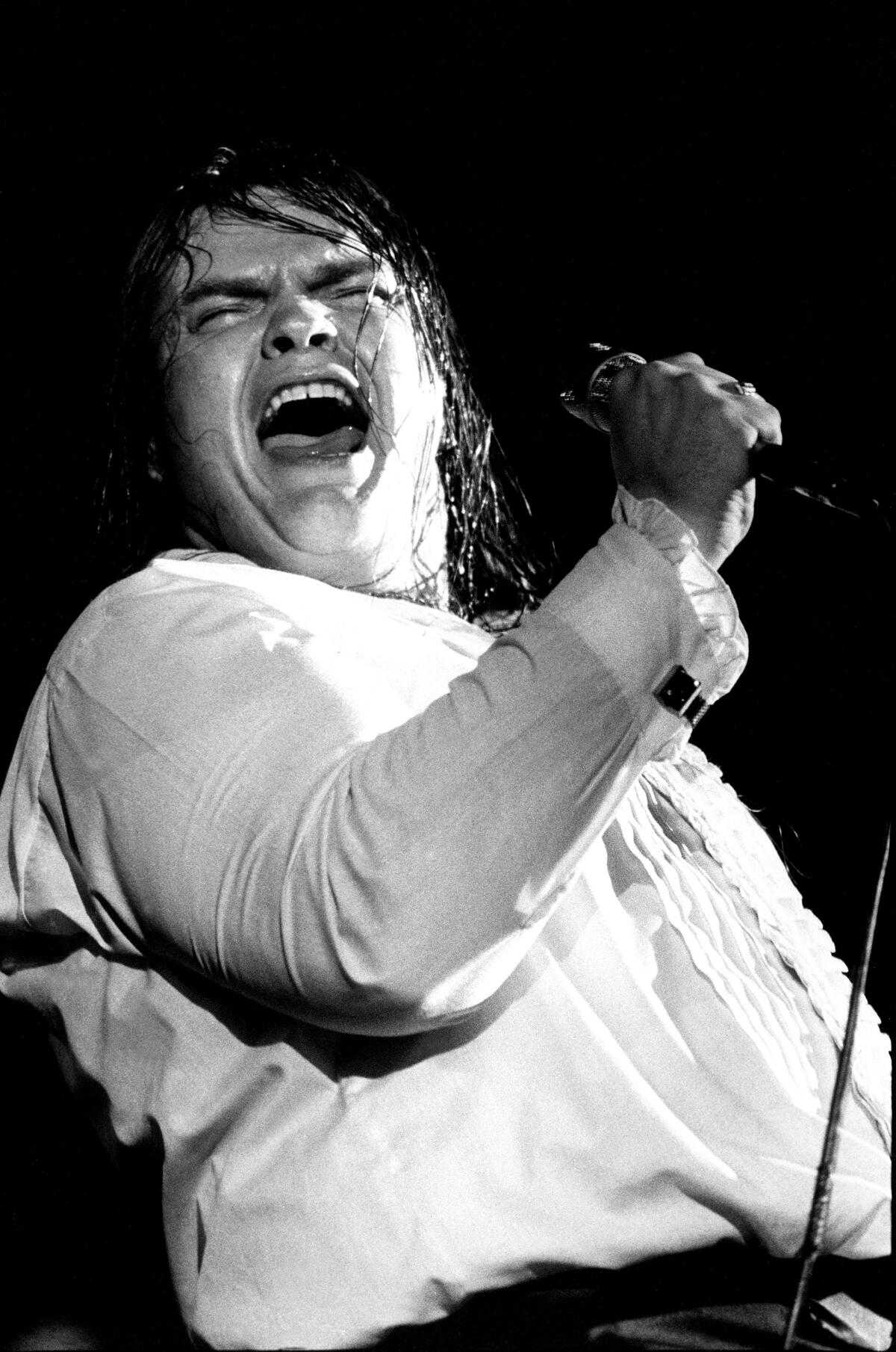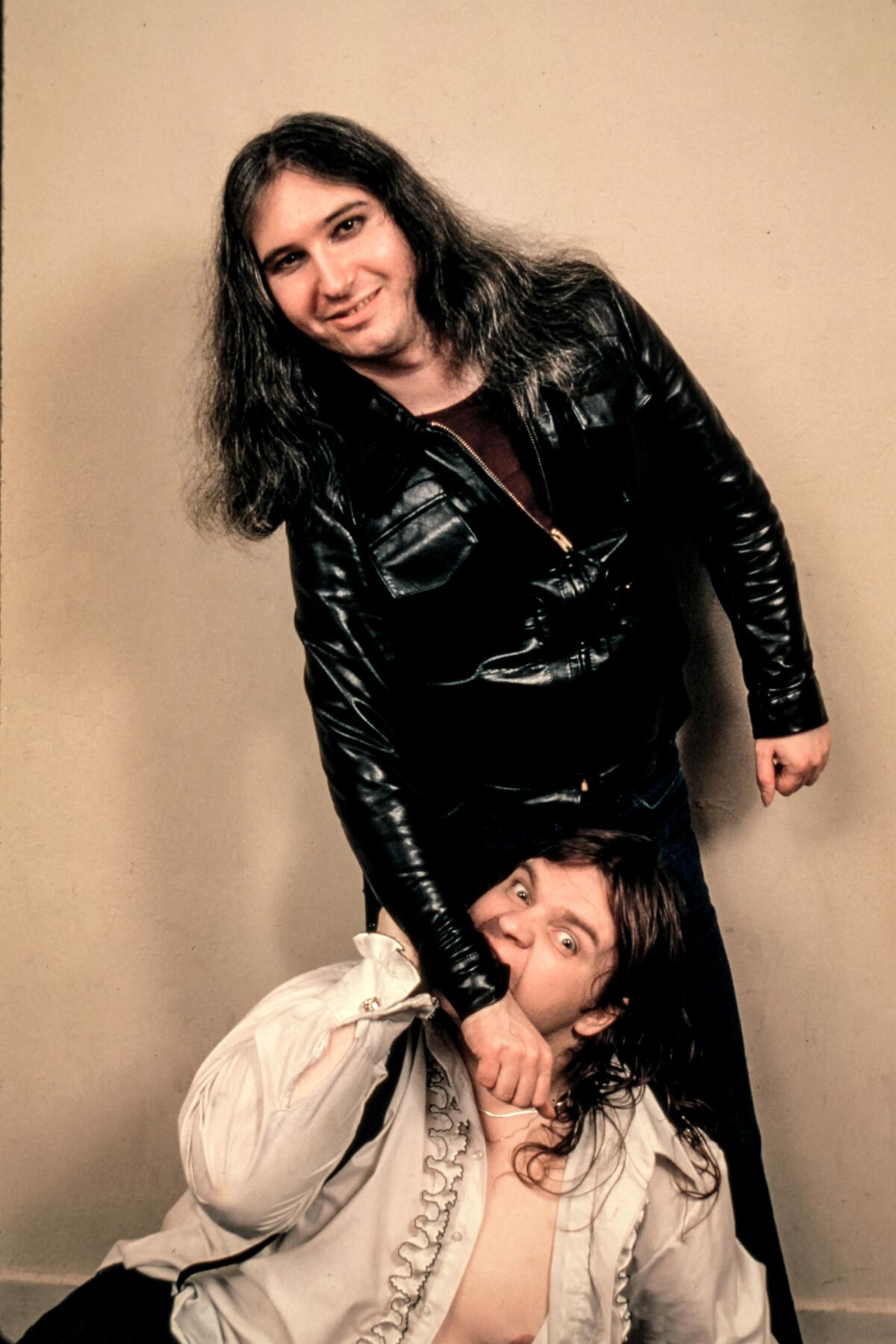Meat Loaf, thunderous ‘Bat Out of Hell’ singer, dies at 74

Meat Loaf, the rock superstar loved by millions for his ‘Bat Out of Hell’ album and for theatrical, dark-hearted anthems, has died.
- Share via
Meat Loaf, the powerhouse rock ‘n’ roll vocalist who shot to stardom with the 1977 album “Bat Out of Hell,” died on Thursday. He was 74.
His death was announced by his family on Facebook. “Our hearts are broken to announce that the incomparable Meat Loaf passed away tonight surrounded by his wife Deborah, daughters Pearl and Amanda and close friends,” read the statement, which continued: “From his heart to your souls … don’t ever stop rocking!”
A cause of death was not given.
A mountain of a man who had an oversized presence on stage and screen — he stole the show as the greaser rebel Eddie in the original Los Angeles production of “The Rocky Horror Show,” along with its 1975 film adaptation — Meat Loaf channeled his love of musical theater into rock ‘n’ roll, with the assistance of Jim Steinman, a songwriter who composed the songs on “Bat Out of Hell” and who became the singer’s lifelong collaborator.

An unexpected blockbuster, “Bat Out of Hell” turned into a classic rock perennial, its enduring hits “You Took the Words Right Out of My Mouth,” “Two Out of Three Ain’t Bad” and “Paradise by the Dashboard Light” buoying Meat Loaf during career slumps and personal troubles while also providing the foundation for his early 1990s comeback. “Bat Out of Hell II: Back Into Hell,” an overdue reunion with Steinman, brought Meat Loaf back into the spotlight thanks to “I’d Do Anything for Love (But I Won’t Do That),” a Grammy-winning No. 1 single from 1993 that became the singer’s signature song.
Meat Loaf maintained a parallel career as an actor, appearing in “Wayne’s World,” “Spice World,” and “Fight Club,” as well as on TV’s “The Celebrity Apprentice” in 2011.
The son of a schoolteacher and a police officer, Meat Loaf was born Marvin Lee Aday on September 27, 1947, in Dallas. His father, Orvis, gave him the nickname “Meat” as a child, claiming that his son resembled “nine and a half pounds of ground chuck.” Meat Loaf’s childhood was a turbulent one due to his father’s alcoholism, resulting in occasional prolonged stays with his grandmother. During his time at Thomas Jefferson High School, he split his time between theater and football; according to lore, his coach is the first person to call Aday “Meat Loaf.” After graduation, he enrolled in Lubbock Christian College, then transferred to the University of North Texas before abandoning school to pursue a musical career in Los Angeles. In 1968, he formed Meat Loaf Soul, a band that cycled through members and name changes, releasing the single “Once Upon a Time” under the moniker Popcorn Blizzard.
Meat Loaf left behind the band he founded to appear in the Los Angeles production of “Hair,” a role he’d repeat in a Detroit production alongside Shaun “Stoney” Murphy. Motown offered the pair a record contract on their rock-oriented subsidiary Rare Earth, resulting in the 1971 album “Stoney & Meatloaf.” Meat Loaf parted ways with Stoney at the conclusion of a tour supporting their duet record, heading to Broadway to appear in “Hair.” Soon, he was cast in the 1973 Public Theater production of “More Than You Deserve,” a play written by Steinman, a New York native who had been writing rock ‘n’ roll musicals since his time at Amherst College in the late 1960s. Steinman recognized a kindred spirit in Meat Loaf and decided to retool the songs he composed for “Neverland,” an adaptation of “Peter Pan,” as a rock ‘n’ roll album for the singer.
As Steinman reworked the “Neverland” material, Meat Loaf headed to Los Angeles to star in “The Rocky Horror Show,” a sexually charged satire of 1960s B-movies. At the original Roxy production of “Rocky Horror,” Meat Loaf played both Dr. Everett von Scott and the rebel Eddie. When the musical was brought to the silver screen as “The Rocky Horror Picture Show” in 1975, Meat Loaf only appeared as Eddie. “The Rocky Horror Picture Show” wasn’t a hit out of the gates, but its popularity grew by word of mouth to become a cult phenomenon, a fate that would echo that of “Bat Out of Hell.”

Steinman and Meat Loaf finished their work on “Bat Out of Hell” after they both completed a stint with the National Lampoon touring company, drawing inspiration from Bruce Springsteen’s cinematic “Born to Run.” Despite Meat Loaf’s appearance on Ted Nugent’s 1976 album “Free-for-All” — he sang five of its nine songs — the pair didn’t garner much interest in their project until they caught the ear of Todd Rundgren. The pop maverick recognized the humor lying within Steinman’s songs and agreed to produce the record, drafting Roy Bittan and Max Weinberg of Springsteen’s E Street Band to augment members of Rundgren’s own band Utopia. Overstuffed and overheated, Rundgren’s production wrung all the adolescent melodrama out of Steinman’s compositions while also highlighting Meat Loaf’s thunderous vocals. It was a distinctive sound, but Meat Loaf and Steinman couldn’t persuade a label to release the album until Cleveland International Records, an offshoot of Epic Records, agreed to issue the album in 1977, nearly a year after its recording.
“Bat Out of Hell” wasn’t an immediate hit. But Meat Loaf’s grandiose live performances — Steinman called them “scripted” — earned him an audience, and soon radio and teenagers nationwide caught on. “Bat Out of Hell” never cracked the Billboard Top 10 but it never faded away either, turning into a pop perennial, with its accompanying singles “Two Out of Three Ain’t Bad,” “Paradise by the Dashboard Light” and “You Took the Words Right Out of My Mouth” becoming classic-rock standards. In the U.S., it was certified 14 times platinum; in the U.K. it stayed on the charts for over 550 weeks.

The phenomenal success of “Bat Out of Hell” joined together Meat Loaf and Steinman in the public eye — it helped that Steinman had a front cover credit on the LP, a rarity for any songwriter — but their relationship was fraught, filled with feuds that frequently led to lawsuits. The first fracture arrived in the early 1980s when Meat Loaf bowed out of a sequel to “Bat Out of Hell” after he lost his voice due to exhaustion.
In addition to touring, Meat Loaf appeared in three feature films during this era, including the lead role in Alan Rudolph’s 1980 film “Roadie.” Steinman, who released the “Bat” sequel sessions as his solo album “Bad for Good,” agreed to collaborate with Meat Loaf for “Dead Ringer,” a 1981 LP that halted the singer’s commercial momentum. Parting ways with Steinman, Meat Loaf cobbled together 1983’s “Midnight at the Lost and Found,” an album that flopped while Bonnie Tyler and Air Supply had hits with “Total Eclipse of the Heart” and “Making Love Out of Nothing at All,” songs Steinman originally wrote for the singer.
As Meat Loaf hopped from label to label throughout the remainder of the 1980s, his albums failed to gain traction. His luck turned around when he reunited with Steinman for 1993’s “Bat Out of Hell II: Back Into Hell.” “I’d Do Anything for Love (But I Won’t Do That),” the album’s bombastic lead single, turned into the biggest hit of Meat Loaf’s career, earning him a Grammy for solo rock performance after becoming his only No. 1 single. Much of the popularity of the song revolves around the quandary over the parenthetical “that,” making it ripe both for parodies and as a musical bed for TV advertisements.

Meat Loaf never stopped recording, but after 1995’s platinum album “Welcome to the Neighbourhood,” he diversified his endeavors, steadily appearing on both film and television, garnering acclaim for his role as Robert Paulsen in David Fincher’s 1999 film “Fight Club.” During the 2000s, he divided his time between acting and touring, collaborating with Desmond Child for 2006’s “Bat Out of Hell III: The Monster is Loose.” “Bat Out of Hell III” was the first “Bat” project to not involve Steinman, a situation that led to a squabble over the rights to the “Bat Out of Hell” title after its release. The pair settled out of court, then reunited for Meat Loaf’s 2016 album “Braver Than We Are.” It was Steinman’s last collection of new songs and turned out to be Meat Loaf’s final album.
During the last decade of his life, Meat Loaf suffered health problems that limited his touring. In its place, he turned toward television and social media. In 2011, he appeared on “The Celebrity Apprentice,” the reality show hosted by future President Donald Trump. In the years that followed, Meat Loaf increasingly aligned himself with conservative news outlets, becoming a regular guest on Mike Huckabee’s talk show and making disparaging comments about climate change activist Greta Thunberg.
Meat Loaf’s death arrived nine months after the passing of Jim Steinman. Upon Steinman’s death, Meat Loaf told Rolling Stone, “I don’t want to die, but I may die this year because of Jim. I’m always with him and he’s right here with me now. I’ve always been with Jim and Jim has always been with me. We belonged heart and soul to each other. We didn’t know each other. We were each other.”
Meat Loaf is survived by his wife Deborah Gillespie and daughters Pearl and Amanda Aday.
Erlewine is a Times special correspondent.
More to Read
The biggest entertainment stories
Get our big stories about Hollywood, film, television, music, arts, culture and more right in your inbox as soon as they publish.
You may occasionally receive promotional content from the Los Angeles Times.










